- Home
- Robert Muchamore
The Prisoner Page 17
The Prisoner Read online
Page 17
Now that Marc’s initial wariness had worn off, he peeled back and carefully replaced the bed clothes. The sheets were cold, as was the kettle on the stove and the dregs in the coffee cup on the bedside table.
Next he looked in a couple of drawers and opened the wardrobe. It seemed Chalice had a slim figure, along with a taste for good clothes and makeup. There was some expensive-looking evening wear, but also sets of plain brown dungarees with ink stains and a couple of wage slips for a job with a printing company.
The printing company tied up with the Canadian’s theory that Chalice was linked to the anti-Nazi newspapers he’d seen in the house in Amiens. The date of birth on a wage slip indicated that Chalice was only nineteen, but she wasn’t earning enough for the nice clothes so Marc reckoned there had to be a rich daddy or rich boyfriend in the mix somewhere.
Marc had clearly unearthed an interesting character, but the door rattled before he could investigate further. A turning key meant it was almost certainly Chalice, but Marc was saved from a confrontation by the double locks.
By the time Chalice was inside, Marc had scrambled out on to the fire escape and the only clue to his entry was that he didn’t get a chance to push the squeaky window back down.
Chalice was attractive, with dark tangled hair and a tight-fitting black dress. The look suggested she’d spent Friday night on the town and slept elsewhere. She’d brought in a fresh, black loaf, a newspaper and the letters from the mailbox downstairs and sat on the edge of her bed dunking the hard bread into a glass of milk.
Marc thought about knocking on the door and introducing himself, but heard Charles Henderson’s voice in the back of his mind, telling him to be patient and act on solid information rather than gut feeling.
Half a day following Chalice would make no difference to the Canadians, but sooner or later someone would spot Marc skulking on the fire escape, so he retreated into the communal bathroom and bolted himself in a cubicle.
An old boy stunk the place up taking a huge half-hour dump and the woman from the apartment with the little kids came in and started yelling at him.
‘What am I supposed to do, shove a cork up my arse?’ the old man roared.
‘You should see a doctor,’ the woman shouted back, as her toddlers stood behind her legs pinching their noses. ‘That smell isn’t natural. It seeps through to my kitchen.’
Marc would have seen the funny side if the stench hadn’t been filling his nostrils. And the shouting match almost made him miss Chalice leaving her room.
She’d tied her hair back and changed into ink-stained printers’ overalls. Marc crept down the fire stairs and emerged on the doorstep seconds before Chalice vanished around a street corner. He kept his distance as he followed her down a couple of narrow streets to a bookshop.
Chalice was only inside for a few seconds, but emerged from the shop with a different package to the one she’d walked in with. Then she cut through a small garden square and glanced around casually before pushing a ground spike into the earth between some shrubs.
Marc had never used a ground spike, but he’d heard about them in training. They were simply a hollow metal spike into which you placed a rolled-up message. Then you pushed it into soft ground, either earth or longish grass, and it would remain invisible until someone came along to dig it out.
Marc was now completely convinced that he’d found someone linked to an anti-German resistance organisation, but also a little concerned. The security in Chalice’s apartment was impeccable, but Marc had followed her for half an hour and not once had she doubled back, or taken an indirect route to see if she was being followed.
Still, Marc knew from his experience in Lorient that most resistance groups were sloppy, and even well-trained agents grew complacent and fell into routine patterns.
Chalice’s next stop was a tobacco stand, where Marc saw nothing beyond an innocent purchase of cigarettes. Fifty metres more took her through an arched, blue doorway into the premises of the Constellation Print Works. She gave friendly nods to women in identical overalls who stood smoking in the doorway.
Marc knew from Chalice’s payslips that her shifts lasted ten hours, with thirty minutes docked for lunch. It was just before noon, so in theory she’d finish work at around ten that evening. She’d be tired and Marc would have the advantage of surprise when he approached her.
CHAPTER TWENTY-SEVEN
Ten hours is a lot of time to kill, but it gave Marc a chance to investigate Chalice in more depth.
When he got back to the little garden, someone had already picked up the ground spike. A dead drop is an excellent way for espionage agents to exchange information without meeting each other, but the less time you leave your message lying around the less chance there is of someone else accidentally finding it. The fact it had been picked up swiftly was another sign that Chalice was part of a reasonably sophisticated resistance operation.
She’d clearly swapped documents or information in the bookshop, so Marc decided to check this out next. The place sold a few new books, but it was mostly second-hand, with closely spaced shelves going from floor to ceiling.
Three women sat behind the counter at the back of the store, which was far more staff than the number of customers demanded. They gossiped about the things you’d expect: husbands and daughters, a touch of luck arriving at a butcher’s shop at the same time as a delivery of lamb.
It didn’t take Marc too long to work out that they were sisters – or possibly sisters-in-law. Evaline was the oldest by a good ten years. Halette and Julie looked alike, though Julie was plumper and had much shorter hair.
When a German came in, Evaline pointed him politely towards a small section of books in German, but when he left she slammed the cash draw and spat on the floor.
‘Dirty Boche money.’
For the past two years, Marc had lived adventures rather than read them. But before the invasion books had been one of the few escapes from the dull life of an orphan, and he voyaged into his past opening books and reading paragraphs from stories he’d enjoyed when he was younger.
‘Can I help you to find anything in particular?’ middle sister Halette asked.
She had shoulder-length hair and a homely face. If she’d been an actress, she would have spent her career playing nurses, or the woman who answers the door when the policeman comes to say that your husband got killed in a car crash.
‘You’ve got lots of nice books,’ Marc said. ‘But I don’t have much money.’
Marc spent a pleasant half-hour talking with Halette about books he’d read, and books that she thought a boy his age might enjoy. While they spoke, nobody bought anything, but several people swapped books at the counter as Chalice had done, while Marc pretended not to notice.
Each time a book arrived, one of the sisters took it out back and spent several minutes doing something with it. Marc’s best guess was that the bookshop was being used by various agents to drop messages, which the women were then taking out back to encode, ready for radio transmission back to Britain.
Either one of the sisters was a radio operator, or if the resistance circuit was more security conscious, the women would leave the coded messages in some kind of dead drop to be transmitted to Britain by a radio operator who they’d possibly never even met.
Eventually, Halette told Marc the name of a good local cafe and sold him a copy of The Three Musketeers for a nominal price. She told him it was the tattiest of the four copies she had in stock and she was glad to be rid of it.
It turned out that the cafe was run by a cousin of the three sisters. Considering the food situation, Marc’s ration coupons bought him a reasonable lunch of hot soup, and the cafe owner didn’t object to him eating the sandwich he’d been given by Sister Madeline.
After enjoying the first few chapters of his book sitting outside the cafe, Marc thought it would be interesting to go back to the little park, and see if he could spot any further shenanigans with ground spikes.
It was ext
remely warm. A bunch of nine-to eleven-year-olds playing football gave Marc no trouble as he lay in the grass, reading bare chested with his shirt rolled as a pillow under his head. It had been ages since he’d been able to sit and read, but although he liked the book his mind kept drifting towards thoughts about Jae.
He knew she’d be working on the farm today. In this heat the sweat would be pouring down her neck. He recalled the earthy smell she had when she’d been working hard, and the way she had to keep pulling the straps of a man’s farm overall up on to her skinny shoulders.
Besides missing Jae, Marc found ways to torture himself. He got paranoid at the unself-conscious way she’d stripped off in front of him, and hugged him naked. What kind of girl did that? One who’d carried on with one of the older farm hands? Or with one of the German officers who lived in her house? Had Jae fallen for Marc like he had for her, or was he making a massive fool of himself?
‘Why are you here?’ a boy asked.
He was one of the footballers. Holes at the knee of his trousers and canvas pumps so tatty that several older siblings must have grown through them before they’d ever graced his feet.
‘What’s it to you?’ Marc asked.
The boy shrugged and didn’t sound unfriendly. ‘We know all the kids round here. Did you just move in or something?’
‘I came to meet an old friend,’ Marc said. ‘But he’s working until later.’
‘Right,’ the kid said.
As the nosy kid went back to playing football, Marc spotted Chalice and two other women helping to load posters on to a cart outside the print works a couple of hundred metres away.
He was too far away to read the text, but he’d seen the poster all over Paris: The picture was of a smiling French gendarme, shaking hands with a smug-looking German soldier and the slogan Working together to keep France safe.
*
As Chalice wasn’t scheduled to finish work until ten, Marc faced a problem with the curfew. The good news was that this quiet suburb didn’t seem to be of much interest to security forces and he’d not seen a soldier or a gendarme since stepping off the bus.
But if things didn’t work out with Chalice he’d need a place to stay overnight. There were no dormitory houses in the area, but there were quite a few empty apartments around and a waitress in a cafe directed him to one of the area’s better buildings, where the concierge said he was welcome to sleep on the floor in a basement laundry room, provided he paid her two francs and behaved himself.
She seemed lonely and after finding Marc a couple of old sofa cushions to rest on, she babbled for ages about the patisserie she’d run with her husband, which had apparently been one of the best in Paris but had to shut down because her husband was sick and she thought it was a crime to cook with saccharin and powdered eggs.
‘When this war’s over, I’m gonna bring my girlfriend to your shop and we’ll sit outside and eat the biggest, fanciest thing on the menu,’ Marc said.
‘Ahh, you have a girl, how sweet!’ the woman said, laughing. ‘No surprise really, you’re a very handsome boy.’
But the woman was less pleased half an hour later when Marc said he had to pop out.
‘But the curfew!’ she said anxiously, before snapping her fingers. ‘You be careful. They’ll put a boy your age on the train to Germany like that.’
Marc gave a cocky smile and told the woman he’d be fine. Chalice’s building was less than a hundred metres away. It wasn’t yet ten, so he decided to wait in the communal toilet. He struggled through a couple more chapters of The Three Musketeers while listening out for the door of Chalice’s apartment, but he was too tense to concentrate.
It was about quarter past ten when Marc heard footsteps in the hallway. It was more than one person, and as he leaned towards the locked cubicle door to try and hear more clearly, someone booted it from the other side.
The door smacked Marc in the head. He crashed back against mildewed wall tiles as a boot hit him in the guts, doubling him over. It was two big men, plain clothes. Both spoke fluent French.
‘Open your mouth,’ one ordered.
Marc tried to wriggle, but the man grabbed him around the neck and clamped a hand over his nostrils. As Marc gasped for air, a rubber ball got rammed in his mouth. Then he got a hard punch in the lower back, and saw the jagged edge of a butcher’s knife at his throat.
‘I will not hesitate to kill you,’ the knifeman said. ‘One wrong sound, one wrong move. You understand?’
CHAPTER TWENTY-EIGHT
Marc glimpsed Chalice in her spattered printer’s overall as the two men pulled him out of the toilet cubicle and hauled him upstairs to the sixth floor. They took the knife away from his throat as they made him climb into a loft, then out on to a flat section of roof.
With a man in front, a man behind and Chalice at the rear, Marc was marched across the rooftops, struggling for breath with the rubber ball pinning his tongue to the roof of his mouth. After clambering over a set of chimney pots he was forced to jump down on to a metal fire escape.
They clanked rapidly down twelve flights of metal fire stairs. Marc looked back and tried to say, ‘I can’t breathe,’ as he was forced to move at speed, but the man behind cuffed him across the back of the head.
After being picked up by the waistband of his trousers and thrown over a crumbling garden wall, Marc was hoisted out of a mix of mud and fire ash, then thrust through an open back door into a basement room with a heavy butcher’s block table and a smell of damp.
Marc saw Halette from the bookshop standing at the bottom of a staircase as one of the big men bent Marc over the table. There wasn’t much light, but Marc was close enough to the rough wooden surface to see that the tabletop was spattered with fresh blood.
‘Who are you?’ Chalice shouted.
Marc couldn’t answer because of the gag. As one of the men smashed a large wooden club against the tabletop deafeningly close to Marc’s ear, the other pulled his trousers and undershorts down to his ankles.
‘Who are you?’
Marc still had no way to answer. The cook’s knife he’d tucked into his belt clanked against the ground, and his bag was thrown across for Halette to inspect.
The bat smashed the table again, spattering some of the pooled blood over Marc’s face as the other man finally ripped the rubber ball out of Marc’s mouth.
He took three huge gasps of air, before the man with the bat pulled him up from the table. He brandished the bat under Marc’s nose and screamed right in his face.
‘One lie out of your mouth and I’m gonna stick this up your skinny pink arse. Got it?’
Marc was trembling, and still catching his breath as he nodded.
Across the room, Halette had switched on a desk lamp and stood carefully inspecting Marc’s identity documents and the contents of his bag.
The man who didn’t have the bat spat in Marc’s face, then pointed at Chalice. ‘Which German bastard sent you here?’ he shouted. ‘I want his name, right now.’
‘There’s no German,’ Marc said, as a loud shudder entered his voice.
‘Bullshit,’ the man roared. ‘You were seen. You snooped around her flat. Then you followed her. You went to the park. You went to the bookshop. Why are you spying on us?’
The one with the bat yanked Marc around and took over the shouting. ‘Lowlife scum. I don’t care if they’re holding your mother and your baby sister hostage. You’re still betraying your country. Tell me every detail and we might let you live.’
Chalice grunted. ‘Or at least, you might not have to die too painfully.’
‘Marc Kilgour,’ Halette from the bookshop said. ‘Is that your real name? These identity documents look very new.’
Marc jumped as the bat slammed the bloody table again.
‘You wanna end up like the last poor bastard we brought in here?’ the other man asked, as he made his point by dabbing a huge nicotine-stained finger into the pooled blood.
Marc had been trained in how
to deal with torture and thought he was pretty tough, but this was complete sensory overload. His hands and legs were shaking and tears streaked down his face.
‘Please let me explain,’ Marc begged.
The man with the bat placed the end under Marc’s chin. ‘This is my lie detector,’ he said. ‘Wanna guess what happens when she detects lies?’
‘I came from Beauvais,’ Marc stuttered. ‘There are two Canadians at my orphanage. They got Chalice’s name and address from a man in Amiens who said she may be able to help.’
Halette looked at Chalice. ‘Who would know you in Amiens?’
‘I have a great-uncle there,’ Chalice said.
The man with the bat turned his spite on Chalice. ‘How in the name of Christ does your uncle know what you’re doing?’
‘He knew early on,’ Chalice said, as she eyed Marc suspiciously. ‘Maybe the Gestapo found something out through him. Oh shit … I hope he’s OK.’
‘Why are you talking to your family?’ the bat man shouted.
‘I wasn’t bloody talking to my family,’ Chalice shouted back. ‘But people aren’t stupid. Our families know what we do.’
Marc was relieved that some of the pressure had turned on Chalice, but that ended swiftly when the heavy not holding the bat slapped his face and pushed his cheek down into a particularly bloody portion of the table.
‘So you come to town. Why not just knock on Chalice’s door? Why follow her? Why go to the book store? Why risk breaking curfew?’
‘I wanted to check her out,’ Marc said. ‘The Canadians said the Gestapo set traps.’
‘Why did you come? Why not them Canadians?’
‘They’ve got no documents.’
Halette stepped closer. She held the file and a piece of carefully bent wire under Marc’s nose. ‘What were you planning to use that for?’
‘You could pick locks with it,’ Marc admitted.
Everyone in the room gasped. The guy with the bat swung it hard against the back of Marc’s legs. He rolled off the table and landed at the boots of the other thug. He was then grabbed off the floor, and slammed down on the table again.

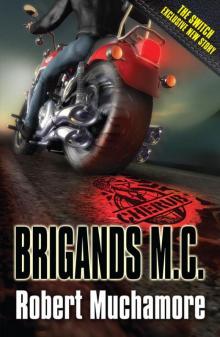 Brigands M.C.
Brigands M.C. Home
Home The General
The General New Guard
New Guard Lone Wolf
Lone Wolf Cherub: Guardian Angel: Book 14
Cherub: Guardian Angel: Book 14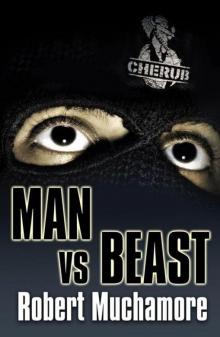 Man vs. Beast
Man vs. Beast The Escape
The Escape Secret Army
Secret Army Henderson's Boys: Eagle Day: Book 2
Henderson's Boys: Eagle Day: Book 2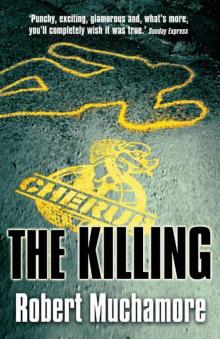 The Killing
The Killing Divine Madness
Divine Madness Class A
Class A The Sleepwalker
The Sleepwalker Henderson's Boys: Grey Wolves
Henderson's Boys: Grey Wolves Henderson's Boys: One Shot Kill: One Shot Kill
Henderson's Boys: One Shot Kill: One Shot Kill Maximum Security
Maximum Security The Prisoner
The Prisoner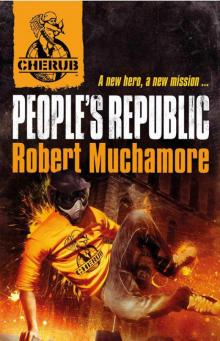 People's Republic
People's Republic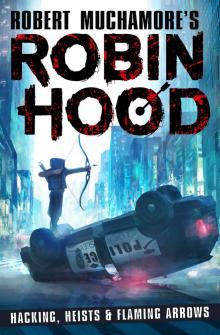 Robin Hood: Hacking, Heists and Flaming Arrows
Robin Hood: Hacking, Heists and Flaming Arrows Shadow Wave
Shadow Wave Mad Dogs
Mad Dogs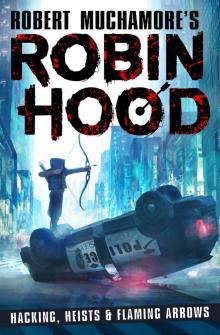 Robin Hood
Robin Hood Robin Hood 2
Robin Hood 2 KILLER T
KILLER T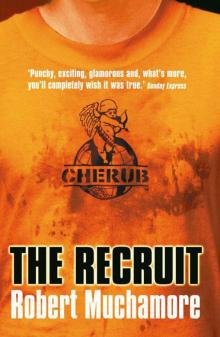 The Recruit
The Recruit Henderson's Boys: Scorched Earth
Henderson's Boys: Scorched Earth The Fall
The Fall Jet Skis, Swamps & Smugglers
Jet Skis, Swamps & Smugglers Black Friday
Black Friday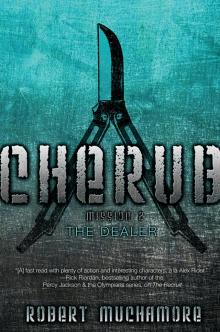 The Dealer
The Dealer CHERUB: Mad Dogs
CHERUB: Mad Dogs Scorched Earth
Scorched Earth Henderson's Boys: Eagle Day
Henderson's Boys: Eagle Day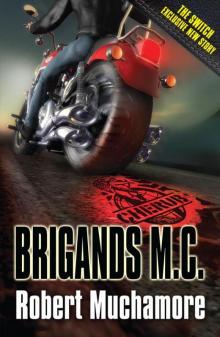 CHERUB: Brigands M.C.
CHERUB: Brigands M.C. CHERUB: Guardian Angel
CHERUB: Guardian Angel CHERUB: The Sleepwalker
CHERUB: The Sleepwalker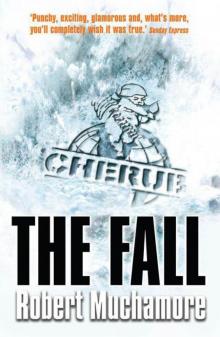 CHERUB: The Fall
CHERUB: The Fall Henderson's Boys: Secret Army
Henderson's Boys: Secret Army CHERUB: Dark Sun
CHERUB: Dark Sun CHERUB: Divine Madness
CHERUB: Divine Madness CHERUB: The General
CHERUB: The General New Guard (CHERUB)
New Guard (CHERUB) CHERUB: Shadow Wave
CHERUB: Shadow Wave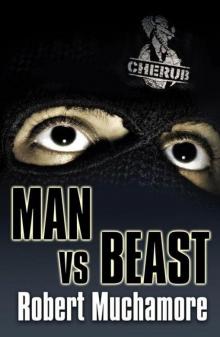 CHERUB: Man vs Beast
CHERUB: Man vs Beast CHERUB: Class A
CHERUB: Class A Henderson’s Boys 4: Grey Wolves
Henderson’s Boys 4: Grey Wolves CHERUB: Maximum Security
CHERUB: Maximum Security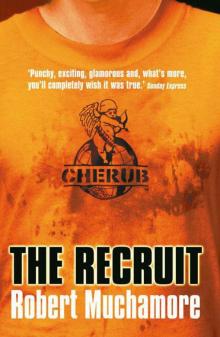 CHERUB: The Recruit
CHERUB: The Recruit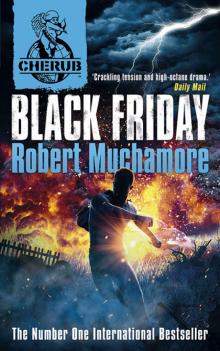 CHERUB: Black Friday
CHERUB: Black Friday One Shot Kill
One Shot Kill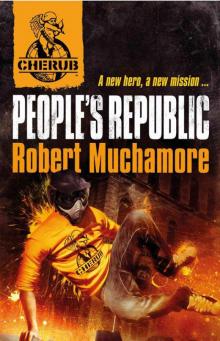 CHERUB: People's Republic
CHERUB: People's Republic